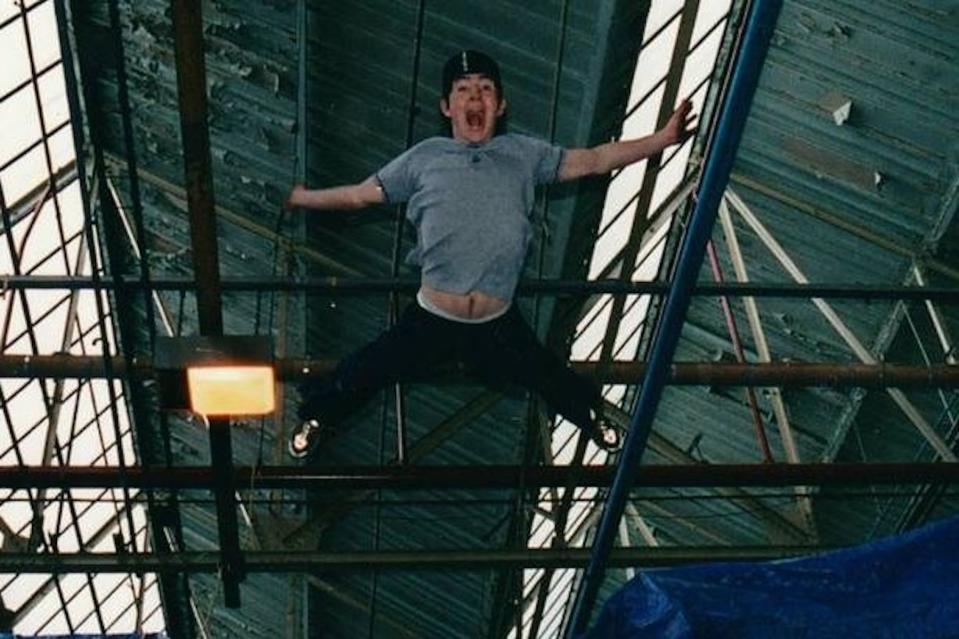Daniel Radcliffe’s Moving Tribute to His Paralyzed ‘Potter’ Stunt Double David Holmes
- Oops!Something went wrong.Please try again later.

The movies like to lionize stunt people, from the fugitive thriller The Stunt Man to Brad Pitt’s Cliff Booth in Once Upon a Time in Hollywood to the upcoming big-screen reboot of The Fall Guy. They do dangerous work in near-anonymity, toiling in close proximity to stardom with few of the rewards. They can be a little crazy. And they have a lot of fun doing things most of us would run away from fast.
But that fun comes with risk, and in the new HBO documentary David Holmes: The Boy Who Lived, we meet someone who has suffered immensely for his passion. Holmes was a child gymnastics prodigy who became a stuntman and worked his way into a dream gig: doubling for Daniel Radcliffe in the Harry Potter movies. The documentary shows Holmes, with an impish swagger, flying through the air like a human puppet, attached to wires, crashing and falling before green screens, then springing up to do it all again.
More from Rolling Stone
JFK's Parkland Doctors Come Forward: Oswald Didn't Act Alone
Mummified Corpses and Miracle Cures: HBO Drops Trailer for 'Love Has Won' Cult Doc
'Escaping Twin Flames': How to Break Up With an Online Dating Cult
Until the time he couldn’t get back up. Holmes broke his neck performing a “jerk back” stunt on the set of Harry Potter and the Deathly Hallows: Part One (2010). He lost use of his legs immediately, then had the even worse fortune of developing a spinal cyst. He endured several operations, including a brain procedure. Now 42, He has somehow maintained the kind of attitude any sane person would want to emulate. As he says in the film, “I’m having a very unique journey on this planet.”
It is very possible and perfectly reasonable to admire Holmes, and Radcliffe (who remains a close friend), and still find The Boy Who Lived wanting. The film’s mandate is to inspire, and it certainly succeeds on this level. Without sugarcoating Holmes’ physical, emotional and psychological pain, The Boy Who Lived shows how Holmes has soldiered through a condition he describes as “the gift that keeps on taking.” He has a strong support system, including Radcliffe, who continues to impress as an admirably grounded and genuine human being after spending his adolescence as the face of a ginormous entertainment franchise. From the beginning he saw Holmes as an older brother figure, and he has stayed close to his side ever since. Radcliffe somehow missed the part where the child star becomes an unhinged jerk.
Both Radcliffe and Holmes are executive producers of the doc, which subsequently feels extremely authorized. This is a film in which the principals seem to control the flow of information and the tone. It’s not an uncommon exchange – access for creative autonomy. And the main players seem like good people. But The Boy Who Lived lacks the complexity and frisson that might have set it apart in an increasingly crowded documentary field, or pushed it beyond its feel-good parameters.

Much is made of Holmes’ enduring friendship with and forgiveness of Greg Powell, the Harry Potter stunt coordinator who oversaw the fateful accident. As you might expect, Powell remains haunted to this day. But while the film takes a cursory look at what happened that day, it doesn’t really push past the surface, or look at what it means to put someone’s life and limbs in jeopardy. We learn that Holmes’ friends and colleagues have worked to make stunt work safer. But what, exactly, does that mean? What are the implications? And how to avoid the kind of tragedy that upended Holmes’ life?
Are these matters essential to this particular film’s inspirational goals? Not really. But addressing them might have added a little depth, a little narrative tension, to what is otherwise a nice little film about a brave guy who has learned to take nothing for granted. It is content to be a solid tale of perseverance and friendship, a story about, as Holmes himself puts it, “overcoming adversity.” Look for nothing more, or less.
Best of Rolling Stone

